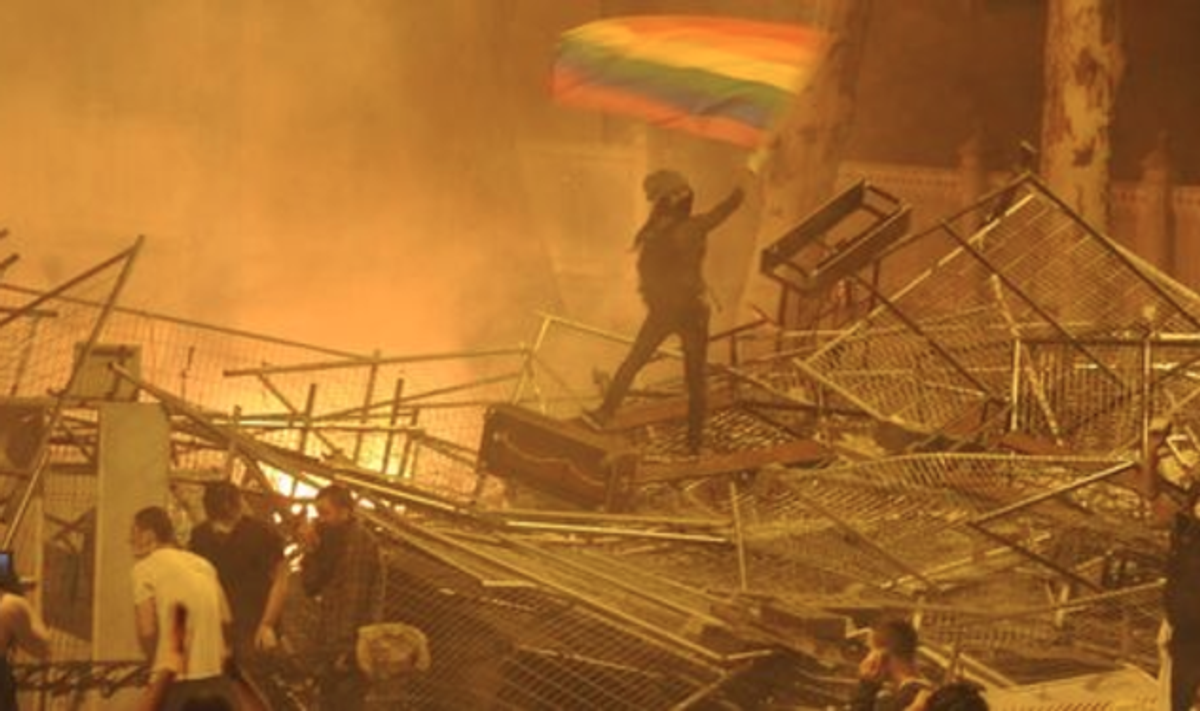News & Opinion
The Gayness of Occupy Gezi

A popular protest provides Turkey's LGBT activists space old and new.
June 21 2013 12:32 PM EST
January 18 2017 12:26 AM EST
By continuing to use our site, you agree to our Private Policy and Terms of Use.

A popular protest provides Turkey's LGBT activists space old and new.
While the Occupy Wall Street movement has simmered here in the States, tensions born from economic and social inequalities have boiled over in Istanbul's Taksim Square, where for three weeks protesters have raised their voices against Prime Minister Tayyip Erdogan's government. And like too many other places, Turkish protesters are feeling the force of state-led security forces ordered to disperse them with tear gas, water cannons, and billy clubs.
This is all unfolding near Gezi Park, a place that was once a clandestine epicenter for gay life in Istanbul, a city in a secular country only slightly more accepting than the rest of socially conservative Turkey. Oray Egin writes at the social news website Vocativ:
"Located just steps away from Taksim Square, the city's main entertainment hub, the park was once the de facto after-hours spot for gay revelers. 'Take a look at every [gay] guidebook in the world, and you'll find Gezi Park there,' says Barbaros Sansal, a fashion designer and activist who's been going to the park for more than 50 years. 'It's the most important meeting point and cruising area for gays in Turkey. We all have memories there.'"
Andy Towle spoke with documentarian Mehmet Binay earlier this week and Binnay, on the ground in Istanbul, gingerly estimated that 5%-10% of the Turkish Occupy movement is LGBT. Even if that's not an accurate number, it's already clear the lavender presence is having a positive impact on the movement.
One activist said he heard people calling Erdogan a "faggot," an epithet that led pro-LGBT activists to start distributing a message reading, "Do not insult (curse/swear at) gays, women, and prostitutes, we are all here together." The message, it seems, has been heard.
Binnay told Towle the crowd has been "very welcoming" and noted, "[The] Gezi movement has united people regardless of their sexual identity, political affiliation or religious practices." This explains the prominence of rainbow flags in shots pouring in from Taksim Square.
And the acceptance within the Occupy movement isn't simply about bringing LGBT people into a broader movement, or even just about the universal reality of economic inequality. It's also an occasion for Turkish gays and lesbians to reclaim a space the Turkish government has tried to keep queer free. As Egin writes:
"First, the local government in Istanbul destroyed the bushes in the park, so there wouldn't be blind hook-up spots for gays. And starting last year, the police made its presence known, regularly carding whomever passed through. 'Even in the morning, if you wanted to just sit and have a coffee on a bench, the police would come and interrogate you,' says Yigit Karaahment, a freelancer writer for Turkish Vogue and GQ. 'So gays were gradually kicked out.'
"Now, however, gays are back in the park and more visible than ever. 'We have created a first-aid area, communicated with doctors, and provided food,' explains Boysan Yakar, an activist for the LGBT Bloc, a gay umbrella organization in Turkey."
And as this old space is reclaimed, Turkish LGBT people, once forced onto the sidelines, if not completely behind the stands, are making new space for themselves on the national team.
Sexy MAGA: Viral post saying Republicans 'have two daddies now' gets a rise from the right